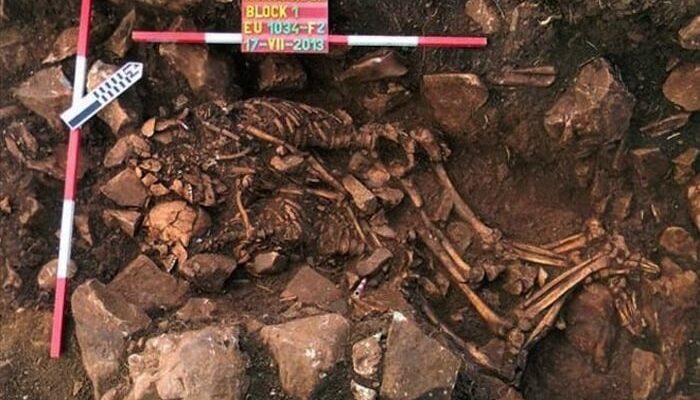
The Neolithic-era find of the skeletons of a couple embracing at the Greek cave of Alepotrypa (“Foxhole”) in Peloponnese in 2015 was rare and fascinating.
The embracing couple’s skeletons were dated to 3800 BC while their DNA analysis confirmed the remains were those of a male and female.
Anastasia Papathanasiou, a Greek archaeologist who has worked at the site since the late 1980s, told National Geographic the couple probably died in the embracing pose or were placed in this pose shortly after death. “It’s a very natural hug; it doesn’t look like they were arranged in this posture at a much later date.”
Some media reports have claimed the couple was stoned to death, but Papathanasiou cautioned that there is no evidence for this. The cause of death is a mystery.
The undisturbed burial was found close to the burial holding the remains of a child and a newborn. A third burial contains the bones of a young man and a young woman facing each other in curled poses, their knees tucked beneath their chins.
Archaeologist George Papathanassopoulos told the Athens-Macedonia News Agency at the time of the discovery that “The type of burial in the fetal position is common in the Neolithic era, but the specific double burial in embrace is one of the earliest known examples.”
All burials are part of a Neolithic cemetery in the greater area of the Neolithic Diros Cave, in western Mani, where excavations have yielded children’s, embryos’ and adults’ burials dating from 4200 to 3800 BC.
Inhabitants of the Greek cave lived during a violent period
A late Neolithic ossuary inside the cave suggests inhabitants lived during a violent period. Some 31 percent of the skeletons showed evidence of blunt cranial trauma, probably inflicted by rocks, stones, or clubs. The wounds were nonlethal and had healed, but this is the highest frequency of head trauma at one site in all of Neolithic Greece, a report in National Geographic said.
According to most recent data and analyses, the cave appears to have been in use from the Early to Final Neolithic (6000-3200 BC) and served throughout as a settlement and cemetery.
At the end of the Final Neolithic (3200 BC), a severe earthquake sealed the entrance of the cave and the remains of its inhabitants inside.

The Greek cave containing the Neolithic embracing couple
The Alepotrypa Cave represents one of the largest Neolithic burial sites known in all of Europe.
Its enormous interior chambers reach more than half a kilometer into a mountain above Diros Bay, and burials in the cave span the entire Neolithic period in Greece, from 6000 to 3200 B.C. There are bones from at least 170 individuals inside the cave.
A treasure trove of ancient discoveries, the site has been excavated since 1970.It has yielded many important findings that contribute to our understanding of the period and the people who lived in the region at the time.
Archeological findings suggest that the earliest inhabitants of the cave were farmers who consumed mainly barley and wheat.
Late Neolithic weapons, pottery, jewelry, and miscellaneous other artifacts, such as stone axes, shell beads, and arrowheads, have all been found at Alepotrypa Cave.
Jewelry made of silver, which was an extremely rare and highly valued substance across Europe at the time, suggests that the inhabitants of the cave were wealthy.
Additionally, scholars have discovered an early copper ax at the site, which is also an extremely rare find for the period.
Related: The Stone Age Couple Locked in Eternal Embrace



